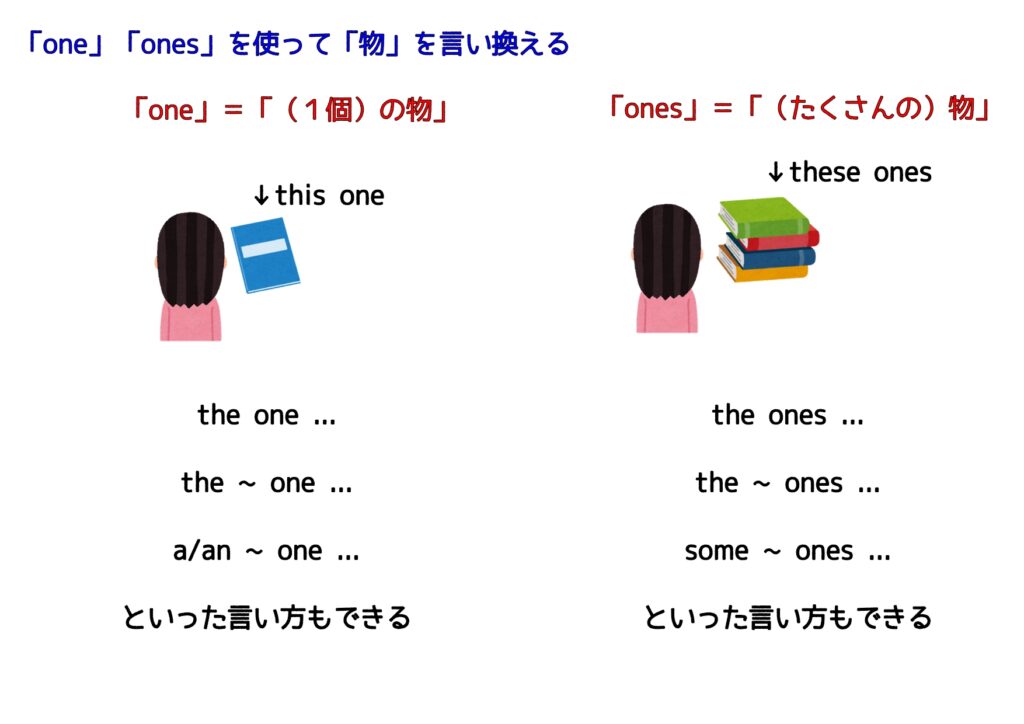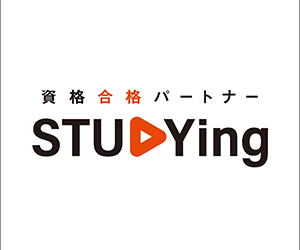第61回:代名詞として、one, onesを活用する

基本的な言葉になりますが、どのような表現として応用しているのかを見てみましょう。
Q. この記事で、一番大事なことって何?
A. 大事なことを、1枚の画像にまとめました。

いちいちノートにまとめるのが面倒だという方、また、
ノートにまとめることが苦手だという方は、ご活用ください。

[広告]
確かな英語力は、日々の継続から。
その継続を後押しする、第二言語習得理論に基づいた
オンライン英語学習プログラムがあります。
英語を使う人のための、確実なスキルアップが望める
7日間の無料体験はこちらから!

One と Ones の使用法と例
文脈から明らかな場合、単数可算名詞を繰り返す代わりに「one」を使用し、複数名詞を繰り返す代わりに「ones」を使用することができます。しかし、不可算名詞に対しては「one」「ones」を使用しません。また、「ones」は具体的なグループの物事を明確に定義しなければ使用できません。よって、不特定なものを指す場合には、「some」を使用します。
1.「one」と「ones」の使用
- 文脈から明らかな場合、単数可算名詞を繰り返す代わりに「one」を使用し、複数名詞を繰り返す代わりに「ones」を使用することができます。
- 例:「Can I get you a drink?」 「It’s okay, I’ve already got one.」(= 一杯の飲み物)
- 例:「I think his best poems are his early ones.」(= 詩)
- しかし、不可算名詞に対しては「one」「ones」を使用しません。
- 例:「If you need any more paper, I’ll bring you some.」(= 紙)(「one」「ones」ではなく「some」を使用)
- 例:「I asked him to get apple juice, but he got orange.」(= オレンジジュース)(「one」「ones」ではなく「orange」を使用)
- 「ones」は具体的なグループの物事を明確に定義しなければ使用できません。不特定のものを指す場合には「some」を使用します。
- 例:「We need new curtains.’ ‘Okay, let’s buy green ones this time. /… ones with flowers on/ those ones.」
- 例:「We need new curtains.’ ‘Okay, let’s buy some.」(「ones」ではなく「some」を使用)
2.「one」「ones」の使用例
- 形容詞として使われる名詞の後に「one」「ones」は使用しません。
- 例:「I thought my memory stick was in my trouser pocket, but it was in my coat pocket.」(「my coat one」ではなく「my coat pocket」を使用)
- 所有格の限定詞(my, your, her など)の後に「one」「ones」を使用するよりも、代わりに「mine」「yours」「hers」などを使用することが好まれます。ただし、非公式なスピーチでは所有格の限定詞 + 「one」「ones」がよく使われます。
- 例:「I’d really like a smartphone like yours.」(または非公式なスピーチでは「… like your one」)
- 「ones」は通常、人ではなく物を指すために使用されます。しかし、比較文では「ones」が人のグループを指すことがより一般的です。
- 例:「Older students seem to work harder than younger ones.」(または「than younger students.」)
- また、「ones」は「the little ones」(小さな子供たち)、「(your) loved ones」(通常、親しい家族)、「(one of) the lucky ones」など、人を指す場合にも使用されます。
3.「one」「ones」を省略する場合
- 「which」の後、最上級形容詞の後、指示代名詞(this, that, these, those)の後、および特定の語(either, neither, another, each, the first/second/last, etc.)の後では、「one」「ones」を省略することができます。
- 例:「When we buy medicines, we have no way of knowing which (ones) contain sugar.」
- 例:「Look at that pumpkin! It’s the biggest (one) I’ve seen this year.」
- 例:「The last test I did was quite easy, but some parts of this (one) are really difficult.」
- 例:「Help yourself to grapes. These (ones) are the sweetest, but those (ones) taste best.」(ただし、一部の人々は「those / these ones」を間違いと考え、特に正式な英語では避けます)
- 「the」「the only」「the main」「every」の後や形容詞の後では、「one」「ones」を省略しません。
- 例:「When you cook clams you shouldn’t eat the ones that have broken shells.」
- 例:「After I got the glasses home, I found that every one was broken.」
- 形容詞の後には通常、省略することができませんが、色の形容詞の後では頻繁に省略されます。
- 例:「’Have you decided which jumper to buy?’ ‘Yes, I think I’ll take the blue (one).’」
結論:
「one」と「ones」は繰り返しを避けるために使用される表現です。文脈から明らかな場合、単数名詞には「one」、複数名詞には「ones」を使用します。ただし、不可算名詞には「one」「ones」を使用しません。また、「ones」は具体的なグループを指し示さなければ使用できず、「some」を使用します。正確な文脈に応じて、「one」「ones」を使い分けることが重要です。
具体例
- We can use one instead of repeating a singular countable noun and ones instead of repeating a plural noun when it is clear from the context what we are talking about:
- “Can I get you a cookie?” “It’s okay, I’ve already had one.” (= a cookie)
- “I love his artwork. The abstract ones are my favorite.” (= artworks)
- “I need a pen.” “Here, take this one.” (= a pen)
- “Which book should I read?” “I recommend the mystery ones.” (= books)
- We don’t use one/ones after nouns used as adjectives:
- “I thought my phone was in my bag, but it was in my jacket pocket.” (not… my jacket one)
- “I’d really like a car like yours.” (or… like your car in informal speech)
- We can leave out one/ones:
- “Look at those flowers! They’re the prettiest I’ve seen this season.”
- “We have two options: this (one) or that (one).”
- “I bought three shirts, and these (ones) are my favorite.”
- “Help yourself to the cookies. The chocolate chip ones are the tastiest.”
- “Karl pointed to the paintings and said I could take either (one).”
- We don’t leave out one/ones:
- “I don’t like the shirts with stripes. I prefer the plain ones.”
- “After I got the glasses home, I found that every one was scratched.”
- “My shoes were so uncomfortable that I had to buy new ones.”
- “Have you decided which dress to wear?” “Yes, I’ll go with the red one.”
These additional examples demonstrate how “one” and “ones” can be used to replace repeated nouns and clarify the context. It’s important to note the cases where one/ones should or should not be used, as well as instances where leaving them out is acceptable or necessary.
[広告]
TOEICのスコアを上げたいけれど、
まとまった勉強時間が取れなくて困っている…
なら、細かいスキマの時間を使いながら、
少しずつスキルを積み重ねてみてはどうでしょう。
スマホ1つでスコアアップが出来る、
オンライン講座のリンクはこちらから。

Q. この文法はどうやって使うのでしょうか?
A. 今回の文法を活用した会話文を見てみましょう。

I’d really like a smartphone like yours.
(君がもってるようなスマートフォンが欲しいんだけど。)

Sure, I can help you find one similar to mine. There are a few options available. You can choose one from the same brand as mine or explore different ones based on your preferences.
(もちろん、似たようなのを見つけるのを手伝ってあげるよ。いくつか選択肢があるよ。自分のと同じブランドの中から選ぶか、君の好みから探してみることもできるよ。)

That sounds good. I’m open to different options. What are some popular ones on the market right now?
(それはいいね。いろんなオプションを考えてみるよ。今人気なのは何かな?)

Well, there’s the latest model from the same brand as mine. It’s highly rated and packed with advanced features. Another option is a smartphone from a different brand known for its exceptional camera quality. Both of these ones are quite popular among tech enthusiasts.
(えっとね、自分のと同じブランドの最新モデルがあるよ。高評価で先進的な機能も備えているんだ。別のブランドのスマートフォンもあるよ。特にカメラの質が優れているんだ。どちらのものもテック愛好家の間ではかなり人気だよ。)

I’m interested in a smartphone with a long battery life. Any recommendations in that category?
(バッテリー持ちがいいスマートフォンに興味があるんだけど、そのカテゴリーでおすすめはある?)

Absolutely! There are a few ones known for their impressive battery performance. One option is a smartphone that has received positive reviews for its long-lasting battery. Another one boasts a large battery capacity, ensuring you won’t have to worry about frequent charging.
(もちろん!バッテリー性能に優れているいくつかのものがあるよ。一つは、持続時間が長いと評判のスマートフォンだよ。もう一つは大容量のバッテリーを搭載していて、頻繁な充電の心配はいらないやつだね。)

That’s exactly what I need. I want to make sure I choose the right one for my needs. Are there any others worth considering?
(それがまさに必要なんだ。自分のニーズに合った正しいものを選びたいんだ。他にも考慮したほうがいいことはある?)

Certainly! If you’re looking for a budget-friendly option, there are some reliable ones available at a more affordable price point. These ones may not have all the high-end features, but they still offer decent performance and functionality.
(もちろん!予算に優しいオプションもいくつかあります。価格が手ごろな範囲で信頼性のあるものがあります。これらのものは最新機能って訳では無いけれど、まずまずの性能と機能を提供しているよ。)
[広告]
ロゼッタストーン・ラーニングセンターで、最先端の教育制度を活用して英語を学びませんか?私たちは個々の学習ペースに合わせてeラーニングと対面教育を組み合わせ、柔軟な学習環境を提供しています。自宅でのeラーニングと対面教育のメリットを最大限に活かし、あなたの英語学習をサポートします。最新のテクノロジーと個別の指導が組み合わさった当センターで、自由な学習スタイルを体験してみませんか?英語学習を楽しく効果的に進めるための環境がここにあります。新たな一歩を踏み出して、新しい英語学習の旅に参加しましょう!

Q. この記事の要点は?
A. one, onesの使い方を確認しました。
- 「one」と「ones」は、文脈から明らかな場合に、単数可算名詞の繰り返しを避けるために使用されます。
- 不可算名詞の代わりに「one」や「ones」は使用しません。
- 「ones」は、具体的なグループを明確に指定しない限り使用しません。代わりに「some」を使用します。
- 名詞が形容詞として使用される場合、所有限定詞(my、your、herなど)の後に「one」や「ones」を使用することはありません。代わりに「mine」や「yours」などを使用しますが、非公式な話し言葉では所有限定詞+「one」や「ones」がよく使われます。
- 通常、「ones」は人ではなく物を指すために使用されますが、比較文で人のグループを指す場合には「ones」がより頻繁に使用されます。
- 「one」や「ones」は省略することもできますが、特定の文脈では省略しないほうが良い場合もあります。
- 「the」や「the only」、「the main」、「every」の後には「one」や「ones」を省略しません。
- 形容詞の後には通常「one」や「ones」を省略しませんが、色の形容詞の後では省略することができる場合があります。
英会話を始めてみたいけれど、どのサービスが良いか分からない…
そんな方は、まず、この記事で3つのサービスを比べてみてはいかがでしょうか?
英語力を効率良く伸ばすことができるサービス3選です。

次回の文法解説は?
繰り返しを避けるために、so と not を使う。
この記事を作る際に参考にした文法の解説書になります。
すべて英語で書かれていますが、練習問題が付いてます。
イギリス英語なので、スペル等の表記が異なる部分もありますが、
「使い方を練習したい」「繰り返し問題を解きたい」
という方は、使ってみても良いかもしれません。

関連記事一覧
他の文法解説記事を検索できます。







-320x180.jpg)




コメント